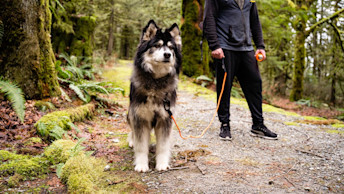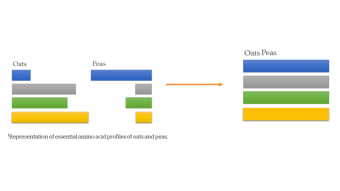July 3, 2021
What Are the Benefits of a Vegan Diet?

Vegan diets for dogs can be a great option, not only for them but for their humans and the environment. People choose to follow a vegan diet for a variety of reasons, including ethical, environmental and health benefits. Many vegan pet parents wish to feed their pets the same type and quality of food that they feed themselves.
From an environmental perspective, eating lower down on the food chain by choosing plant foods instead of animal foods is more efficient and creates a smaller ecological footprint. It is estimated that it takes approximately 10g of plant protein fed to livestock to produce 1g of meat protein.1 Vegan diets appeal to consumers concerned about animal welfare since animal-sourced ingredients are eliminated on a vegan diet.
For dogs with sensitivities to animal proteins, a vegan diet may be a solution. A vegan diet can also be used as a rotational diet for pet parents who want to offer their dog a diet that includes meat, but want to use a plant-based, sustainable diet for their pet once in a while.
Can a dog’s nutrient requirements be met through a vegan diet?
Unlike cats who have requirements for nutrients that are only found in animal tissue,dogs are able to meet their nutrient requirements from a plant-only diet. A study that examined the safety of a vegetarian diet for dogs found that Siberian Husky sled dogs fed a meat-free diet for 16 weeks, including 10 weeks of competitive racing, had normal blood values and were in excellent physical condition upon veterinary examination.2 However, there are several nutrients that are found primarily in animal food sources that require special attention when creating a vegan diet for dogs.
Protein
Amino acids are the building blocks of protein. There are ten essential amino acids that dogs must obtain from their diet. Protein from foods is broken down in the digestive tract to amino acids which are then used to make body proteins for tissue maintenance and repair as well as production of antibodies and enzymes. Protein can also be used as an energy source, though carbohydrate and fat are preferred so that protein can be spared for its other vital functions.
Animal proteins are considered high quality proteins because they provide all of the essential amino acids in the correct amounts required by dogs. Plant proteins are often lower in one or more essential amino acid (limiting amino acid), but this can easily be corrected by eating complementary plant protein sources. For example, oats and peas have different amino acid profiles that together provide all essential amino acids (figure1). By providing a variety of plant-based protein sources, complete and balanced vegan diets for dogs are able to provide sufficient levels of protein and all essential amino acids.

Taurine
Taurine is an amino acid found in animal tissue. It is not used to make body proteins, but plays a key role in retinal function, cardiac function, reproduction and growth. Dogs can make taurine from the amino acids cysteine and methionine when these amino acids are provided in sufficient amounts.3 However, some breeds and conditions are associated with decreased taurine synthesis and a dietary source of taurine is required.4 Taurine is available as a supplement produced from non-animal origin material that can be used in vegan dog diets to ensure adequate dietary taurine.
Fatty acids
Dietary fat is a source of energy, but also provides essential fatty acids that are required for various metabolic reactions. Dogs require dietary sources of both omega-6 andomega-3 fatty acids. Vegetable oils, such as sunflower oil, are rich sources of omega-6linoleic acid and flaxseed is high in omega-3 alpha-linolenic acid.
Vitamin A
Vitamin A is a fat soluble vitamin that is found in animal food sources and plays a key role in maintaining healthy skin, eyes and immune system. Dogs, like humans, can also make vitamin A from carotenoids3 (e.g. beta-carotene) which are found in plant foods. Although dogs can meet their vitamin A requirement from beta-carotene, pet foods are supplemented with vitamin A. A vegan vitamin A supplement is available for dog diets which is produced from material of non-animal origin.
Vitamin D
Vitamin D is important for calcium metabolism for the maintenance of bones and teeth and is also involved in the function of muscles, nerves and the immune system. There are two forms of vitamin D. Vitamin D2, or ergocalciferol, is usually the form produced by plants. Vitamin D3, or cholecalciferol, is the form produced from ultraviolet sunlight exposure on the skin, but synthesis is considered to be insignificant in dogs5 and a dietary source is required. There are only a few foods that are natural sources of vitamin D, such as fatty fish like salmon as well as egg yolks. Vitamin D2 is available as a supplement for vegan dog diets.
Vitamin B12
Vitamin B12 is important for normal blood cell and nerve function. Natural sources of this vitamin are only found in animal foods. However, vitamin B12 is available as a supplement made from non-animal origin materials suitable for use in vegan diets.
How do you choose ingredients to be included in a vegan recipe for dogs?
The ingredients for a complete and balanced vegan diet are carefully selected to provide all of the nutrients required by dogs.
Peas and lentils are locally grown crops that are nutrient-rich and offer environmental benefits. They are an excellent source of carbohydrate, fibre, protein, and essential vitamins and minerals. In addition, peas are used as a tool in sustainable agriculture because they contribute to soil health by adding nitrogen.
Organic oats and barley are whole grains. They offer a complementary essential amino acid profile to peas and lentils which allows a vegan diet to provide all of the essential amino acids that dogs require.
Sunflower oil is a non-genetically engineered crop that provides the essential omega-6 fatty acid, linoleic acid.
Potato and quinoa are sources of protein and carbohydrate.
Blueberries, cranberries and carrots are nutrient-rich and high in antioxidants.
Primary dried yeast is a nutritional yeast that is a source of protein and B vitamins.
Vitamin, mineral and amino acid supplements are included in most pet foods, and particularly vegan diets, to ensure that adequate levels of these essential nutrients are provided.

Can dogs easily digest a plant-based diet?
Unlike cats, dogs are able digest, absorb and utilize the nutrients in a vegan diet. The amount of protein, carbohydrate and fat in a complete and balanced vegan diet is similar to many commercial diets that contain meat. The primary ingredients in a vegan diet, grains and pulses (peas and lentils), provide a mixture of protein, carbohydrate and fat. The grinding and cooking of these ingredients during kibble production makes these ingredients highly digestible. Fibre, the indigestible portion of food, impacts digestive health and stool quality and volume. As shown in the guaranteed analysis on the petfood label, the crude fibre content in a vegan diet is generally similar to that of diets that contain meat.
This blog was originally published on October 20th, 2016. Revised July 2021.
Reijnders L, Soret S. Quantification of the environmental impact of different dietary protein choices. Am J Clin Nutr 2003;78:664s-668s.
Brown WY, Vanselow BA, Redman AJ, et al. An experimental meat-free diet maintained haematological characteristics in sprint-racing sled dogs. Br J Nutr 2009;102:1318-1323.
National Research Council. Nutrient Requirements of Dogs and Cats. Washington, D.C.: The National Academies Press, 2006.
Sanderson SL. Taurine and carnitine in canine cardiomyopathy. Vet Clin North Am Small Anim Pract 2006;36:1325-1343, vii-viii.
Weidner N, Verbrugghe A. Current knowledge of vitamin D in dogs. Crit Rev Food Sci Nutr 2016:0.


